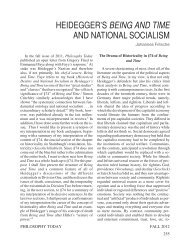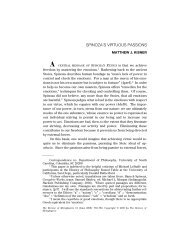The Essay as Self-Knowledge: Montaigne's Philosophical ...
The Essay as Self-Knowledge: Montaigne's Philosophical ...
The Essay as Self-Knowledge: Montaigne's Philosophical ...
Create successful ePaper yourself
Turn your PDF publications into a flip-book with our unique Google optimized e-Paper software.
80 ANN HARTLE<br />
Among its possible meanings are: mise à l’épreuve, and trial, conveying a<br />
sense of danger (4, 5, 9). E. V. Telle, “A propos du mot ‘essai’ chez Montaigne,”<br />
Bibliothèque d’humanisme et renaissance 30 (1968), also specifies the meaning<br />
of essay <strong>as</strong> test (229). In Latin, he says, ‘essai’ is periculum, i.e., danger<br />
(231). See also Donald M. Frame, Montaigne’s Essais: A Study (Englewood<br />
Cliffs, N.J.: Prentice Hall, 1969), 34, and Alan M. Bo<strong>as</strong>e, “<strong>The</strong> Early History<br />
of the Essai Title in France and Britain,” in Studies in French Literature, Presented<br />
to H. W. Lawton, ed. J. C. Ireson, I. D. McFarlane, and Garnet Rees<br />
(New York: Manchester University Press, Barnes and Noble, 1968), esp. 69<br />
and 71. George Lukacs, Soul and Form, trans. Anna Bostock (Cambridge,<br />
M<strong>as</strong>s.: MIT Press, 1974), 9, writes of the title <strong>Essay</strong>s: “the simple modesty of<br />
this word is an arrogant courtesy. <strong>The</strong> essayist dismisses his own proud hopes<br />
which sometimes lead him to believe that he h<strong>as</strong> come close to the ultimate. . . .<br />
But he ironically adapts himself to this smallness—the eternal smallness of<br />
the most profound work of the intellect in face of life—and even emph<strong>as</strong>izes<br />
it with ironic modesty.” Joseph Epstein, “<strong>The</strong> Personal <strong>Essay</strong>: A Form of Discovery,”<br />
in <strong>The</strong> Norton Book of Personal <strong>Essay</strong>s, ed. Joseph Epstein (New<br />
York and London: W.W. Norton and Co., 1997), 15, describes the personal<br />
essay <strong>as</strong> a “form of discovery,” i.e., one starts out with something one does<br />
not understand, without a precise definition; then one discovers where one<br />
stands and learns what one really thinks.<br />
4. Michael Oakeshott, On Human Conduct (Oxford: Oxford University<br />
Press, 1975; reprint, Oxford: Clarendon Press, 1991), vii.<br />
5. Maurice Merleau-Ponty, “Reading Montaigne,” in Signs, trans. Richard<br />
C. McCleary (Evanston, Ill.: Northwestern University Press, 1964), 206.<br />
See Jules Brody, “‘Du repentir’ (III:2): A Philological Reading,” Yale French<br />
Studies 64 (1983): 252, on the philological circularity of Montaigne’s writing.<br />
R. Lane Kauffmann, “<strong>The</strong> Skewed Path: <strong>Essay</strong>ing <strong>as</strong> Un-methodical<br />
Method,” Diogenes 143 (Fall 1988), 90: says that in the essay the familiar is<br />
regarded <strong>as</strong> unknown. He also describes the essay <strong>as</strong> a “critique of instrumental<br />
re<strong>as</strong>on” (72).<br />
6. References to the French text of the Essais are to the edition by Pierre<br />
Villey and V.-L. Saulnier, 3 vols., Presses Universitaires de France, 2d ed.,<br />
“Quadrige,” 1992. <strong>The</strong> English translation is that of Donald Frame, <strong>The</strong> Complete<br />
<strong>Essay</strong>s of Montaigne, Stanford University Press, 1943. In some instances,<br />
I have emended Frame’s translation. <strong>The</strong> citation (VS874; F666) refers to p.<br />
874 of the Villey-Saulnier edition and to p. 666 of the Frame translation.<br />
7. Blaise P<strong>as</strong>cal, Pensées et opuscules, ed. Léon Brunschvicg (Paris:<br />
Librairie Hachette, 1946), revised edition, pensée no. 64.<br />
8. François Rigolot, “Montaigne’s Purloined Letters,” Yale French Studies<br />
64 (1983): 145–66, claims that the essays try to approximate <strong>as</strong> closely <strong>as</strong><br />
possible the idealized epistolary style.<br />
9. David Hume, <strong>Essay</strong>s: Moral, Political, and Literary, ed. Eugene F.<br />
Miller (Indianapolis, Ind.: Liberty Cl<strong>as</strong>sics, 1985), 534.

















